How to Set Social Media Goals Effectively: Expert's Insights
Discover effective strategies to set and achieve your social media goals. Elevate your online presence and engage your audience like never before.


High engagement. More followers. More leads from social.
The truth is, there will always be a lot of social media goals to chase. But if you go after each, you will end up spreading your efforts too thin.
Now picture this instead. One clear goal that directs each part of your social media marketing strategy. Your content choices make more sense. Your visuals feel intentional. Your CTAs actually work. Even your campaigns stop feeling like guesswork. Suddenly, the whole thing clicks.
In this guide, I’ll show you how to set goals that create that kind of clarity. You will find a simple process, real examples, and practical tips shared by two experts – Rehmat Asrar, founder of Social Tango, and Irina-Alexandra Drăguțu, social media specialist at Clinica Sante.
Let’s get started.
Key takeaways
-
Why is it important to set social media goals? Setting social media goals ensures your efforts solve real business problems and drive meaningful outcomes, not just vanity metrics.
-
How to set social media goals? Effective social media goals start from a business tension, define the audience behavior you want to change, and are measured using a small set of outcome-driven metrics supported by clear leading indicators.
-
Common goal-setting mistakes and how to avoid them: Most social media goals fail when teams chase too many vanity metrics instead of flexible, business-linked outcomes that leadership actually cares about.
What are social media goals?
Social media goals are clear, measurable targets that guide what you want to achieve through your social channels.
I use them to give direction to my content, help track progress, and ensure every post supports a bigger purpose instead of random activity.
Here are a few examples of social media goals:
- Increase brand awareness
- Grow your follower base
- Boost engagement on key platforms
- Generate leads through social channels
Why is it important to set social media goals?
Social media marketing goals give your strategy a clear direction. More so, here are four key benefits we have seen as a result of setting clear social media objectives.
Helps prove competence and earn trust quickly
Many of our customers described stepping into roles where they had to prove the ROI of social media immediately.
Goals give you that proof instantly. They turn vague updates into sharp answers. So when someone asks, “How’s social doing?” you are not scrambling. You can point to real targets and real progress. It signals competence fast and builds trust.
Clarifies what data actually matters
Most teams are drowning in numbers. Because they don’t know which metrics to prioritize. When your goal is clear, the noise fades. You stop obsessing over vanity metrics and start tracking what moves the needle.
Maybe you realise your tools are missing cross-platform benchmarks or you were wasting time running after likes. Whatever the gap, the goal exposes it.
This saves everyone from chasing random numbers that look impressive but do nothing for the business.
Helps justify budget and tool decisions
When you can tie a tool or subscription directly to a target, management becomes more ready to invest in it. It becomes a need if you want to hit your numbers.
Teams frequently use this to get approvals. Maybe you show the CFO how a tool strengthens competitive analysis and gets you important data to improve engagement. And suddenly the contract gets signed.
Aligns social media with business goals
Clear goals help you connect daily content to the things that actually move the business.
Suddenly executives start paying more attention to your reports. Because your metrics support real decisions. And your work stops looking like ‘posting for the sake of posting’ and starts making a real impact.
How to set social media goals
Setting social media goals doesn’t have to be challenging. Here’s a 6-step tried-and-tested process marketers use.
Step 1: Start with the business tension, not the goal
Most people jump straight to goals like ‘increase followers.’ That is the fastest way to create a goal that sounds nice but does nothing for the business. Start with the tension instead.
Ask yourself, “What problem is social supposed to solve this quarter?”
Maybe your leads are low quality. Maybe decision-makers barely know your brand. Maybe repeat purchases are flat. Maybe the sales cycle moves at the speed of a Sunday nap. Whatever the tension is, name it.
This instantly grounds your goal in reality and sets you up to create a target that actually drives revenue.
Irina talked about this by taking follower growth metric as an example. She said —
I wish brands would stop obsessing over follower growth. Honestly, it’s not that the metric is the problem. The problem is treating follower count as the goal. A large audience doesn’t guarantee conversions, loyalty, or even real engagement.
In fact, I’ve worked with brands that had massive followings but struggled to generate quality comments or messages. They got only some reactions and emojis. Instead of chasing numbers, focus on quality follower growth that can lead to something. When you aim for qualified attention, everything shifts for the better.
Step 2: Identify the behavioral change you want in your audience
Every social media strategy goal comes down to one simple idea. You want your audience to do something.
Before you pick metrics, figure out what that behavior is. Ask yourself, “What do I want people to do differently because of my content?”
Do you want them to trust you more? Inquire more? Click more? Stay longer? Share your posts without being asked? Once you name the behavior everything else becomes clearer.
This step saves you from choosing metrics that look impressive but do nothing to move your audience in the direction you actually need.
For example, instead of saying, ‘We want to increase engagement,’ point out first what does that mean. Irina mentioned looking for signs like —
The real indicators of connection are the actions that require more effort. When someone leaves a thoughtful comment, asks a question, answers your poll, or shares a personal experience, that matters. Saves and shares are even more telling. People only save content they find genuinely valuable, and they only share what they believe others should see. And then there are private messages. When someone reaches out directly after seeing a post, that’s a sign of trust and genuine interest.
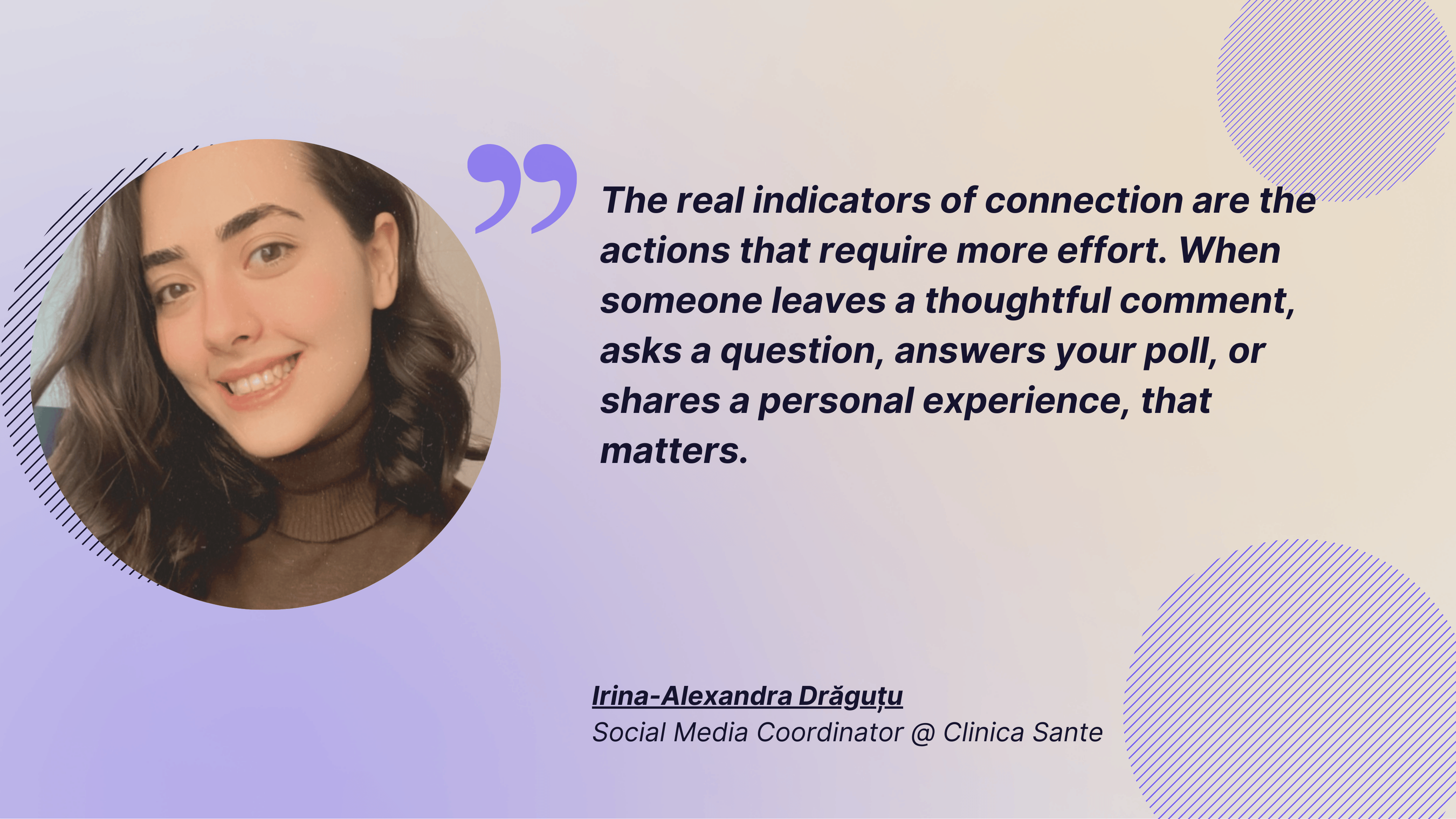
Step 3: Translate the desired behavior into 1-2 core social outcomes
Once you know the behavior you want from your audience, turn it into a clear outcome. This is where your goal starts taking shape. This helps define what success actually looks like on social.
Maybe you want to become top of mind. Maybe you want to strengthen thought leadership. Maybe you want people to consider your product more seriously. Maybe you want to drive trial sign ups or demo requests. Pick one or two outcomes and stop there.
Each outcome points you toward the right KPIs.
When asked about how Rehmat goes through this step, she said —
In my experience, the outcomes come from what the brand wants to achieve. What do they want to be known for? What do they want to achieve on social media? Do they just want presence so their pages don’t look empty or do they want to create a community? Do they want to tell a story with their brand and bring people together or is it simply a checklist item for them?
When working with different brands I try to understand the thought process of the brand owner or marketer. I work with them to understand what they want. And then I start setting my outcome, goals, objectives, KPIs.
Step 4: Choose only those metrics that directly tie with the outcome
Now that you have your core outcome, pick the metrics that actually prove you achieved it. Not the ones that look fancy or the ones everyone else is tracking.
It’s time to be really selective and stick to the ones that tie straight back to your outcome.
For example, if your outcome is brand visibility, your metrics might be reach, profile visits, and shares. If your outcome is product consideration, you might track demo clicks or time spent on key pages.
This step saves you from bloated dashboards filled with numbers. And most importantly, it keeps your team focused on selective KPIs.
Step 5: Set ‘lagging’ and ‘leading’ goal pairs
I have seen most goals for social media fall apart because they only target the result. Those KPIs are your lagging metrics. They tell you what happened after the work was done. While they are helpful, they are not enough. You also need leading indicators, which are the inputs that make the result possible.
Think of it as pairing the destination with the route.
Here are some examples:
- Lagging goal: 300 demo requests
Leading: 3 expert videos/week + 2 customer stories/month
- Lagging: 10% increase in reach
Leading: 5 Reels/week + trending audios + collaboration posts
This helps your team stay on track and know what inputs they need to focus on.
Step 6: Stress-test your goal using the “Would leadership care?” check
A goal is only as strong as its impact on the business. So before you lock anything in, run it through the most honest filter you have. Would leadership care?
I generally ask these three questions to see if my goal is actually worth it:
- Does this metric tie to revenue, trust, or pipeline?
- Will this goal influence any real decisions?
- Would achieving it actually change something for the business?
If the answer feels shaky, I go back, refine it, and anchor it closer to what the business values.
8 social media goals examples
Maybe you have an overarching social media goal or a collection of tiny ones. If you are unsure how to shape them or want some clarity, the examples below will help.
Here are eight common social media goals for businesses, the metrics that actually matter for each one, and practical ways to achieve them.
1. Goal: Increase brand awareness
This goal is all about getting your brand in front of the right people consistently. The more familiar they are with you, the easier every future conversion becomes.
Metrics to track:
- Reach: Reach shows how many unique people your content is getting in front of.
I track it in Socialinsider to understand which formats, topics, or posting times help introduce my brand to new audiences.
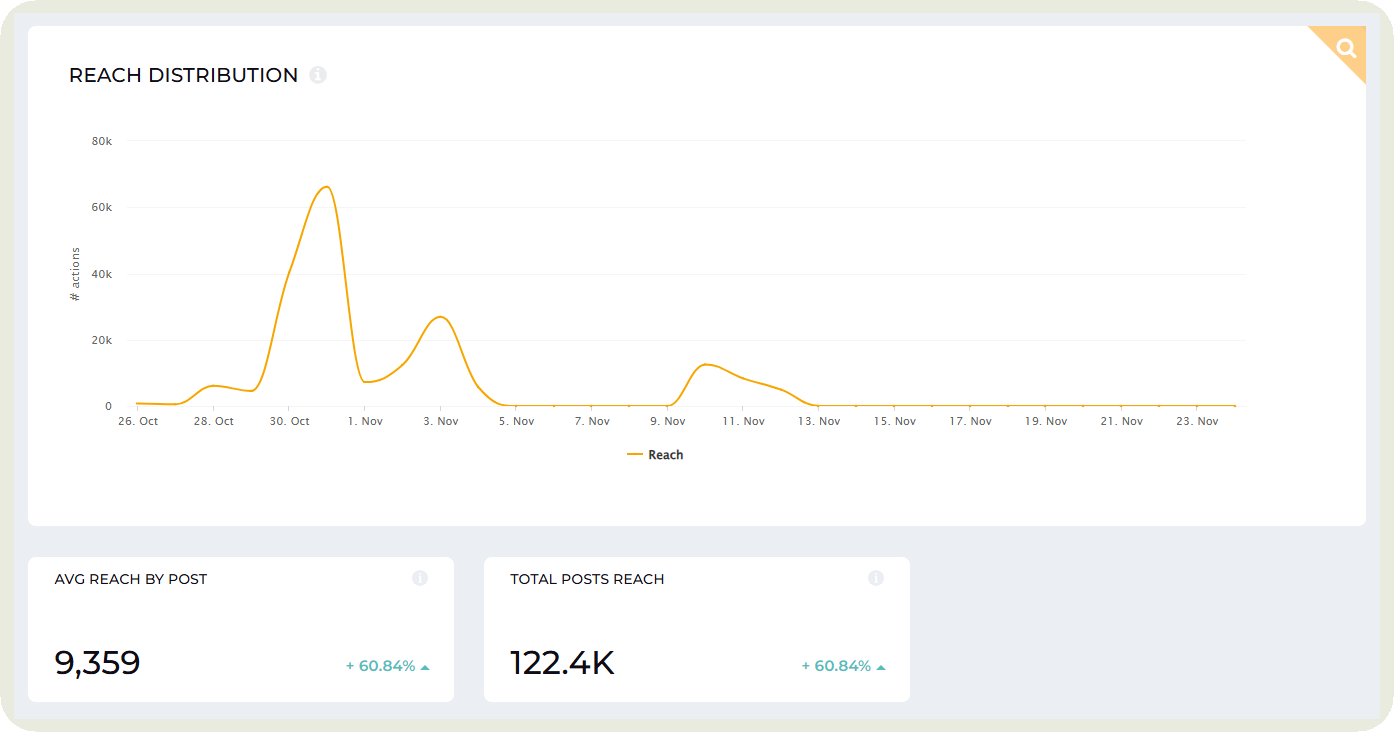
- Profile visits: It tells you how many viewers were curious enough to explore your brand page beyond a single post.
Use this metric to gauge whether your content sparks enough interest to make users take further action. Also, optimize your bio, highlights, and pinned posts for stronger first impressions.
- Follower growth: Reflects how many people see your post, page and hit the ‘Follow’ button to stay connected with your brand long term.
You can even check historical follower growth in Socialinsider to run a long-term analysis.
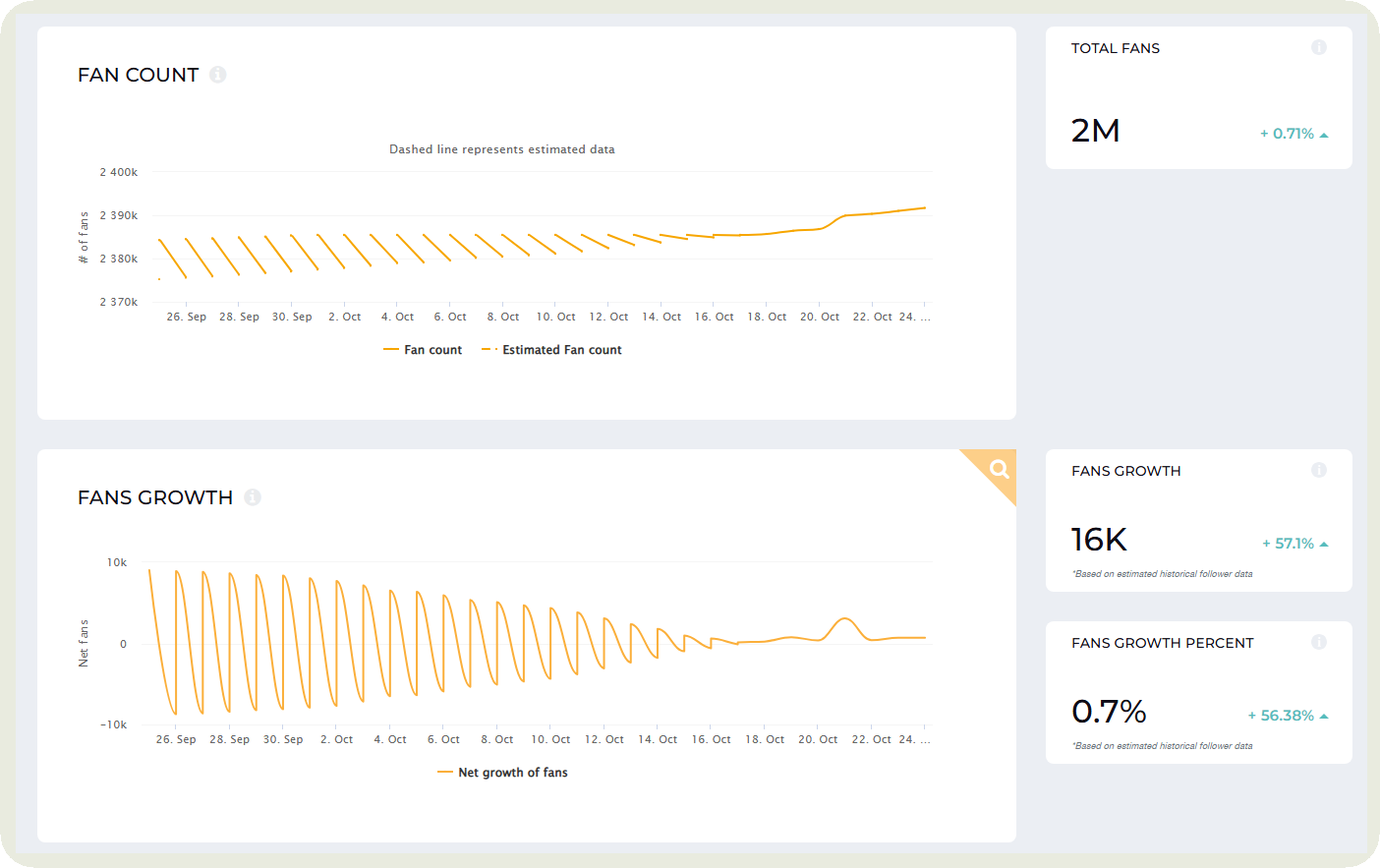
I usually see which kinds of content attracts the right audience and adjust my posting style or messaging to boost this growth.
- Share rate: Share rate shows how often people find your content valuable enough to pass along.
You can see how the number of shares increases over time for your page on Socialinsider.

You can even click on sharp upticks in Socialinsider to see which posts generated a lot of shares. I use it to learn what resonates deeply and create more share-worthy posts that organically expand my reach without extra ad spend.
How to achieve/exceed this social media goal?
- Use high retention short-form videos: On a lot of platforms, short videos keep attention longer and get pushed harder by algorithms. Focus on hooks, quick pacing, and clear value so viewers stay until the end and the platform rewards you with wider reach.
- Collaborate with powerful creators: Creators introduce your brand to audiences you would never reach alone. Partner with voices your target audience already trusts to boost visibility instantly and build credibility faster.
Here’s an example from Nike.

- Post during peak activity windows: Your content performs better when your audience is actually online to see it.
You can either use native insights to spot your peak engagement times or use Socialinsider to find the times when you get the most engagement.
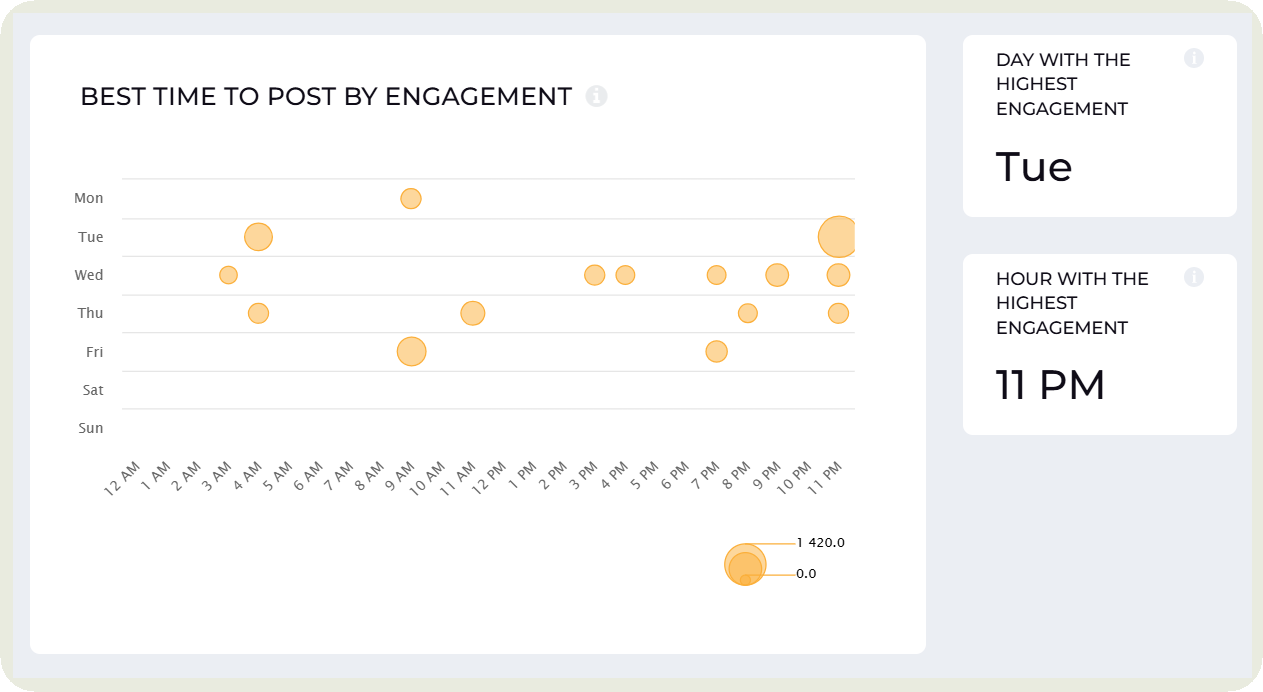
- Create share-worthy content: Memes, bold opinions, and timely takes travel fast. When you create content people want to pass along, you turn your audience into your distribution engine and help boost awareness.
Here’s how we do it at Socialinsider.

2: Goal: Boost engagement
You set this social media goal when you want people to interact more with your content. It signals that you have a strong, participative community and helps your brand gain more visibility across platforms.
Metrics to track
- Engagement rate: This shows how many people actively interact with your content compared to how many saw it.
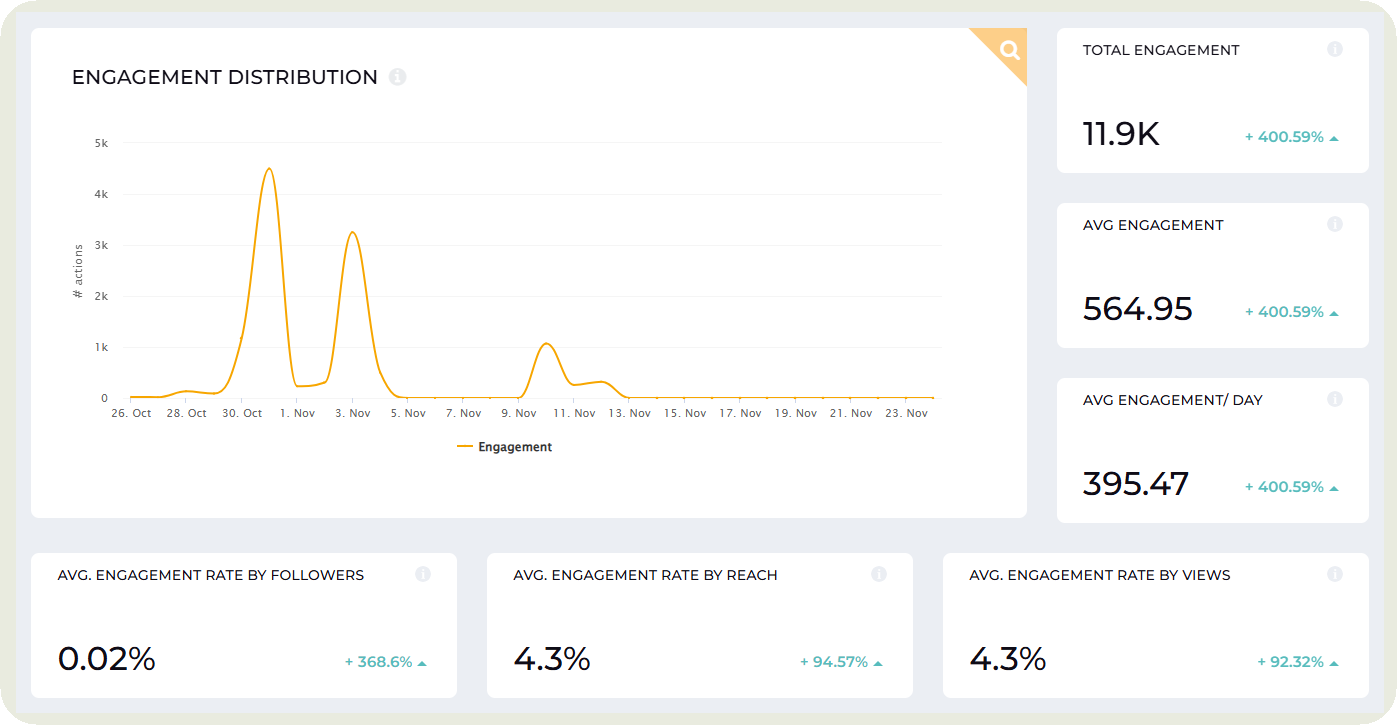
I usually compare my engagement rate to previous periods to see whether I am growing my page in the right way. You can even compare it with your industry and use it to understand which posts truly resonate and refine your content strategy accordingly.
- Comments: Comments reveal depth of engagement and how willing people are to start conversations with your brand.
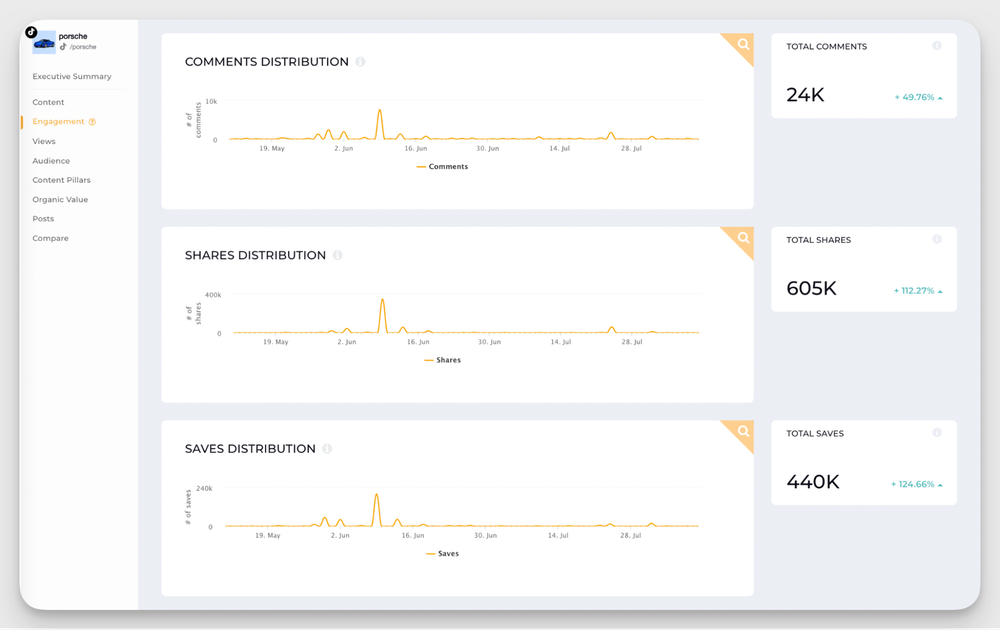
Track them to identify content that sparks dialogue, questions, or strong reactions.
Irina goes a step further and talks about how she labels quality comments —
I also pay atention to meaningful comments versus generic reactions. It’s one thing to get a flood of “Love this!” or emojis, but it’s something entirely different when people ask follow‑up questions, challenge an idea, or share their own experience related to the topic you shared in social media. That kind of engagement usually comes from people who are actively thinking about the problem your product/service solves.
- Saves: It indicates content that audiences find valuable enough to revisit later.
I use this metric to double down on formats that deliver strong educational or inspirational value.
Irina mentioned saves as an important metric to track when she talked about engagement as a goal. She said,
I take saves into consideration because they are a strong signal that your content is useful enough for someone to return to later — and buyers who are in research mode tend to save a lot. When a post gets a high number of saves relative to its reach, I know I’ve created something that speaks directly to a real need or pain point. So, I know that piece of content attracts the right buyers.
- Shares: They show that your content is compelling enough for someone to pass it along to others.
High share numbers help expand your reach organically and boost algorithmic visibility.
- Reactions: Reactions measure quick, low-effort engagement and give you an early signal of whether a post is resonating emotionally.
And by the way, Socialinsider shows your distribution of reactions for Facebook pages.
Track patterns further to understand which tone and topics get which kind of reactions.
- Completion rate: It tells you how many viewers watched your video content from start to finish.
It is a strong indicator of content quality and is often rewarded with greater reach by the algorithm.
Irina talked about this metric when she said:
When people watch a video (until the end or 70-80%) or swipe through every slide, it shows a level of interest that goes far beyond casual scrolling. Buyers who see value in what you’re saying tend to stay with you until the last frame.
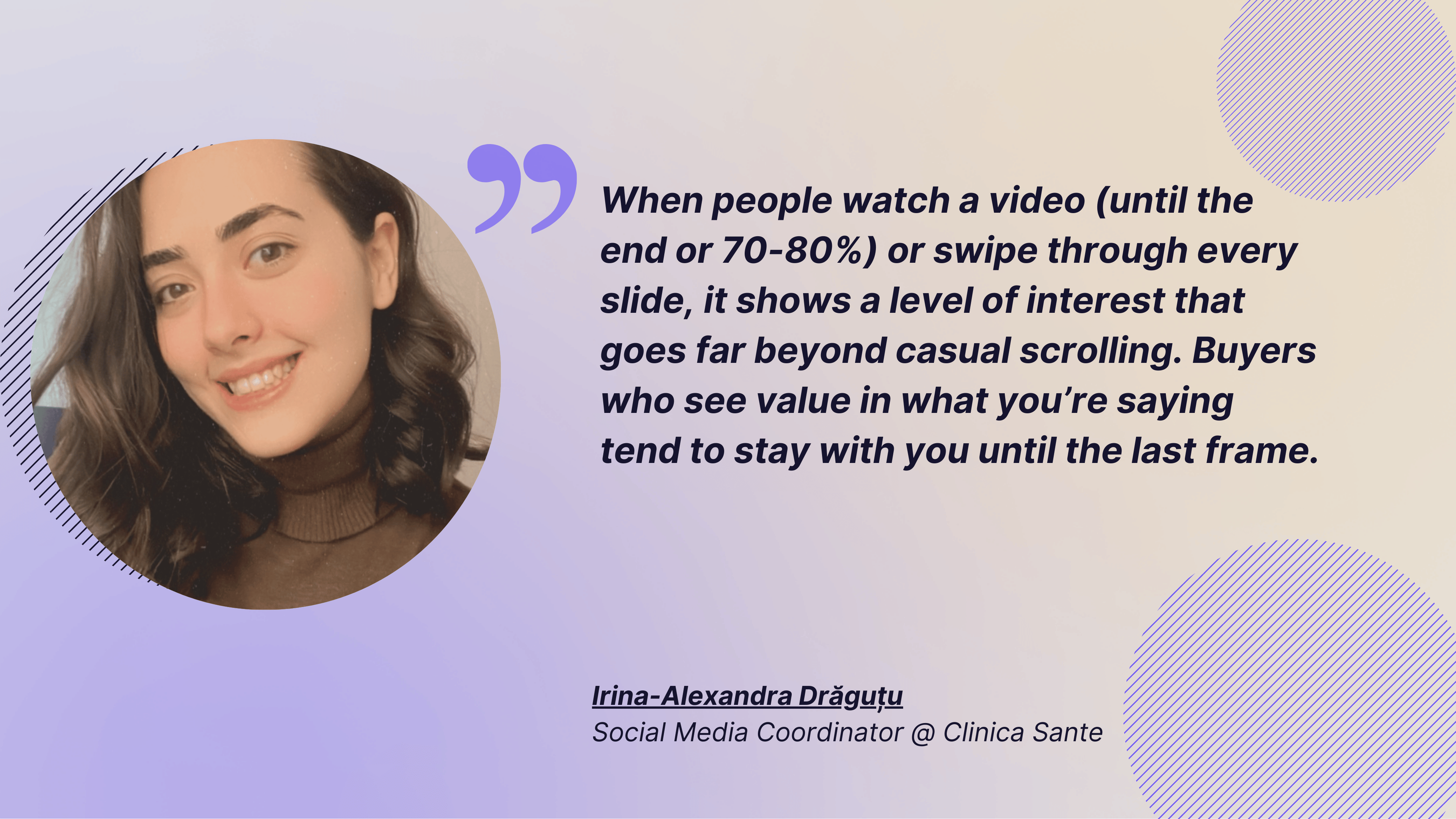
How to achieve/exceed this social media goal?
- End posts with conversation prompts: A simple question at the end of a post can double engagement by giving people something specific to respond to.

- Analyze your content pillars: Look at which content pillars consistently drive strong engagement and which ones flop. Instead of manually seeing this, Socialinsider provides you an automated summary.
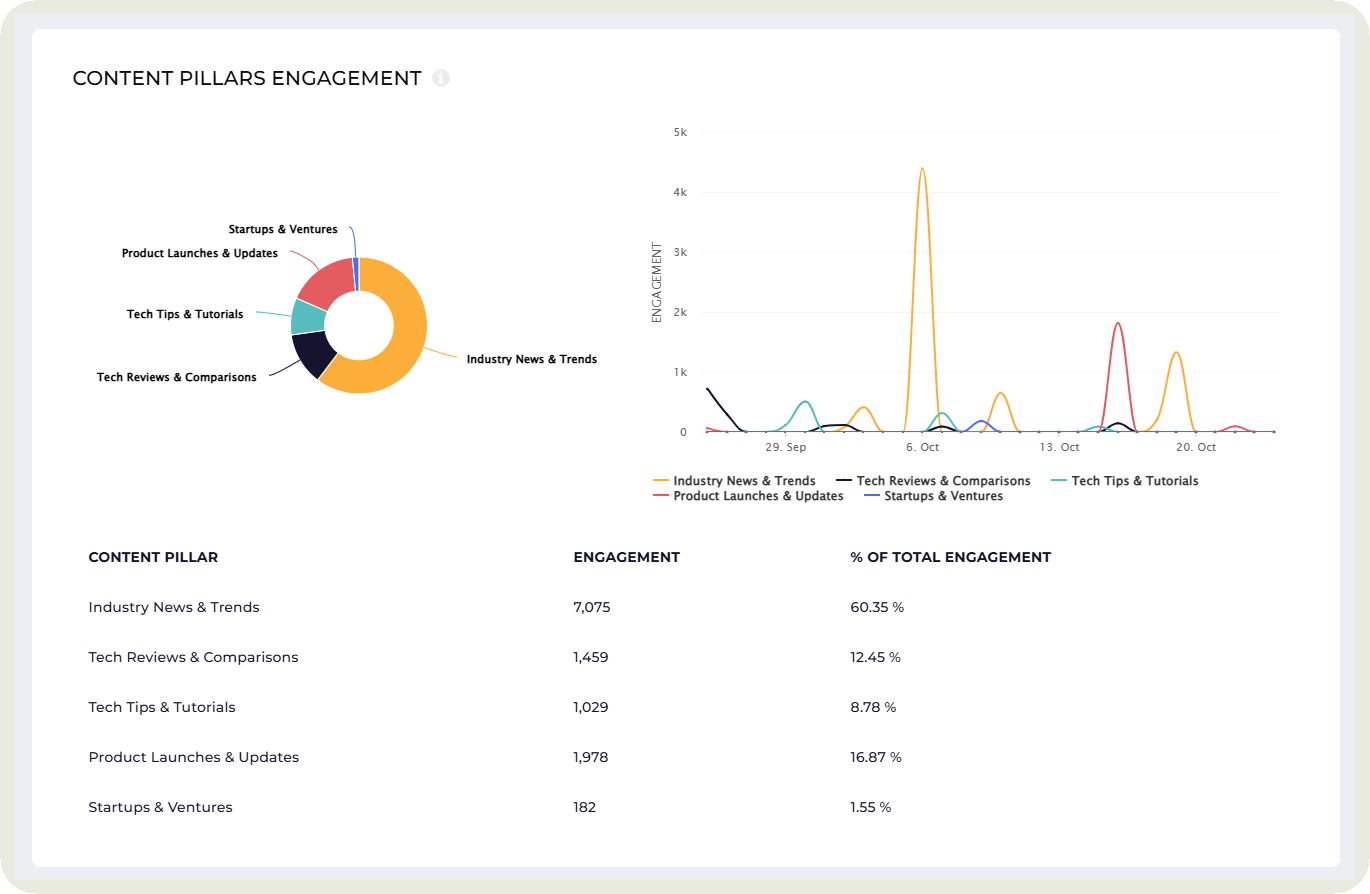
You can then double down on what works so your content naturally attracts more reactions, comments, and shares.
- Use carousels or multiple photo posts: Carousels keep people interacting longer and encourage swipes, which boosts engagement signals.
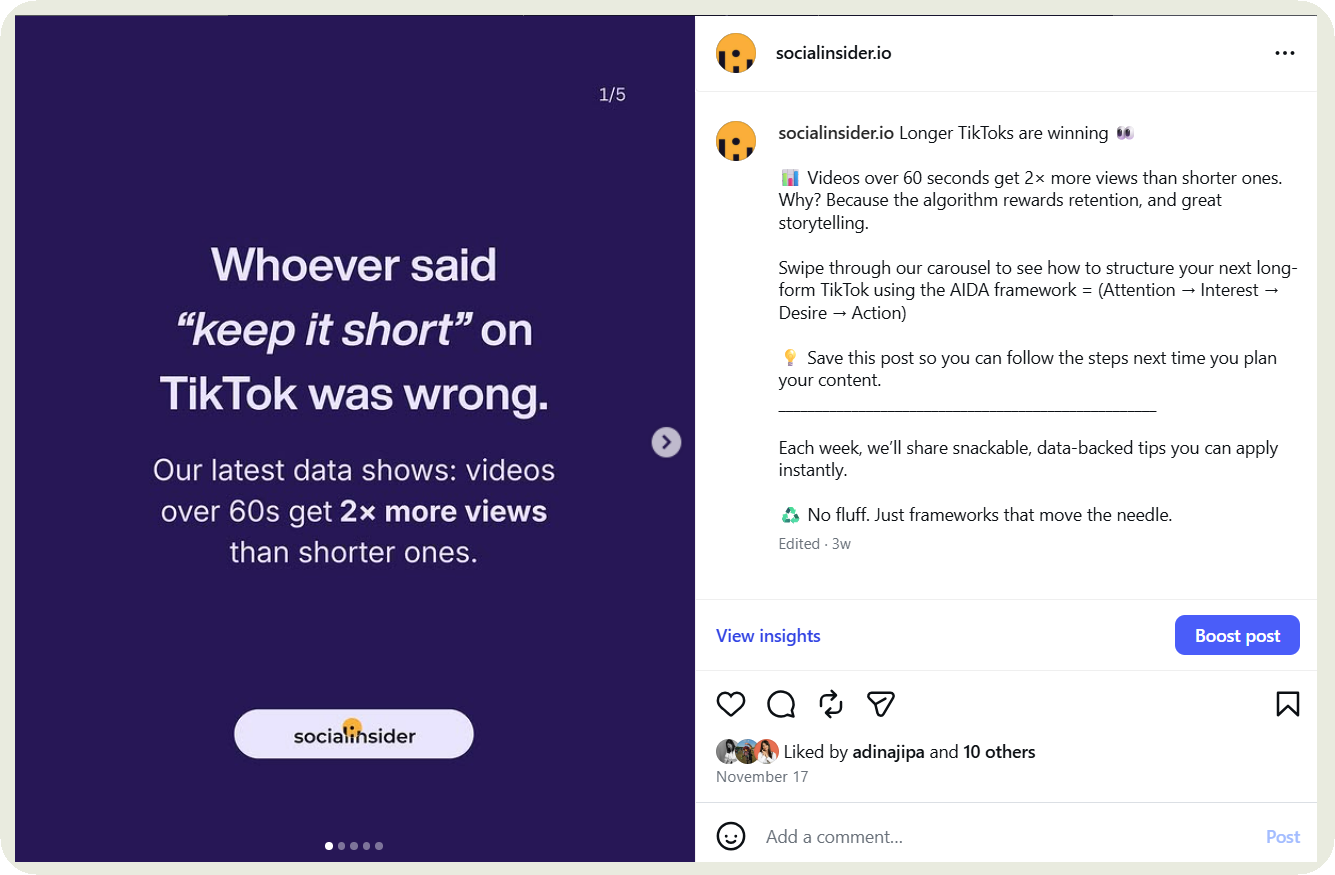
They also let you deliver more value in a single piece of content.
- Share emotional stories or behind-the-scenes content: People engage more when they feel something. Personal moments, hardships, lessons, and behind-the-scenes glimpses create emotional connection and encourage engagement.
- Respond to comments fast to generate threads: Quick replies keep the comment section alive and encourage others to join in.
3. Goal: Strengthen brand credibility and trust
You set this goal when you want your audience to see your brand as reliable, knowledgeable, and worth paying attention to.
It helps your audience choose you over competitors.
Metrics to track
- Comments expressing trust or validation: Look for comments where people say things like “this helped,” “this makes sense,” or “I trust this brand.”
These show your messaging is landing and your brand is becoming a reliable voice in your niche.
- Positive sentiment: Track how often conversations around your brand lean positive versus neutral or negative.
Rising positive sentiment signals growing trust and healthier brand perception.
- Repeat viewers: When people keep coming back to your content, it shows consistency.
I monitor repeat viewers to see which topics or formats build long-term trust.
- Testimonials or UGC volume: More user-generated content and testimonials mean people feel comfortable associating publicly with your brand.
This is one of the strongest signs of trust and social proof.
How to achieve/exceed this social media goal?
- Feature employees as creators: Letting your team show up on camera humanizes your brand and builds instant trust. Audiences connect more deeply when they see real people.

- Share customer transformations: Before and after stories, wins, and real results act as powerful social proof. These stories reassure potential customers that your brand delivers on its promises.
- Host expert-led Lives: Live sessions with specialists give your audience direct access to credible knowledge. They position your brand as an authority and allow viewers to ask questions in real time.
- Publish behind-the-scenes workflows and real stories: Showing how your team works, makes decisions, and solves problems builds transparency. BTS content makes your brand feel honest, approachable, and worthy of long-term trust.
4. Goal: Drive website traffic
You set this goal when you want social media to actively send people to your website, landing pages, or blog.
This gives your brand more opportunities to convert.
Metrics to track
- Link clicks: This tells you how many people took the first step from social to your site.
- CTR (Click Through Rate): CTR shows the percentage of viewers who clicked after seeing your content.
A higher CTR means your messaging, visuals, and call to action are compelling enough to spark action.
- Landing page view through rate: This reveals how many people not only clicked your link but also stayed long enough for the page to load and be viewed.
It helps you assess whether your landing page matches the promise made in your post.
- On site actions (via UTM data): UTMs show what visitors did once they landed on your site, like reading a blog, adding to cart, or signing up.
This helps you understand which social content drives meaningful behavior, not just empty clicks.
Irina considers this an important metric when qualifying website traffic —
Looking back at my years working in social media, I realized pretty quickly that not all engagement is equal and that the real test of whether you’re attracting the right buyers happens after the scroll. One of the clearest indicators for me has always been what people do once they leave the platform. When I see that traffic coming from social spends real time on product pages, pricing sections, blog articles or case studies, that’s when I know I’m reaching people with genuine intent.

How to achieve/exceed this social media goal?
- Use carousels that build curiosity and end with ‘link in bio’: Carousels let you tease value slide by slide and create a natural cliffhanger.
Ending with a clear ‘link in bio’ prompt nudges people to continue looking for more information or details on your website.
- Share problem solution breakdowns: When you clearly explain a problem and hint at a deeper solution available on your site, people are more likely to click through. This approach positions your website as the next logical step.
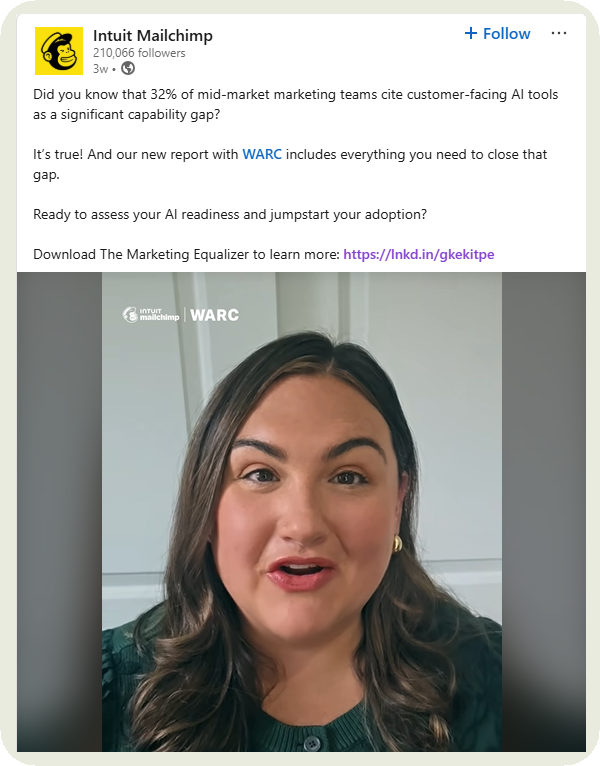
- Create SEO driven posts that address search queries: Posts built around what people are already searching for tend to attract high-intent viewers.
When your captions or visuals lead to a more detailed blog or page, clicks rise organically.
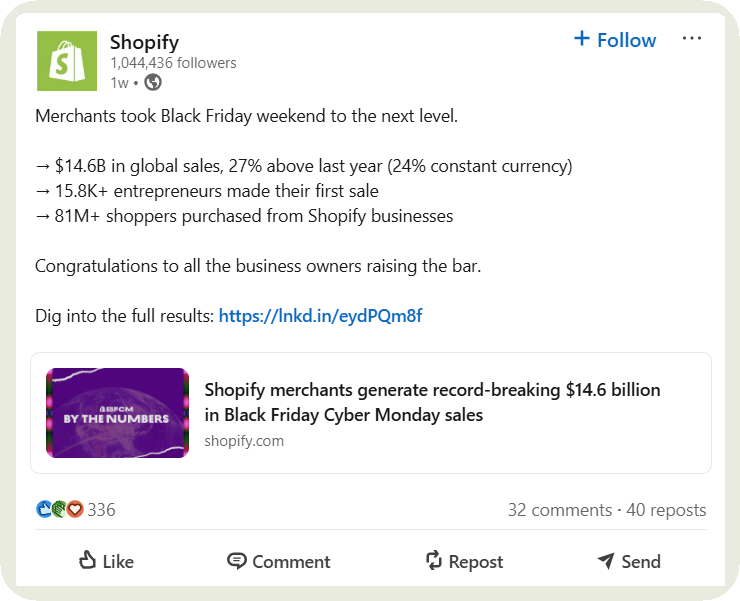
- Run retargeted posts featuring product demos: Retargeted content hits people who already showed interest, making them more likely to click. Product demos work especially well because they answer questions and reduce hesitation before the click.
5. Goal: Generate leads from social
You set this goal when you want social media to do more than create buzz and actually bring in qualified prospects.
It focuses on turning attention into action so your channels start generating steady inquiries, sign-ups, and high-intent leads.
Metrics to track
- Form submissions: Tracks how many people are willing to share their information after engaging with your content. It is a direct indicator of lead interest and conversion potential.
- Demo requests: Shows how many viewers are ready to look at what your product or service offers. Demo requests often signal high intent and stronger lead quality.
- Lead quality score: Helps you understand whether the leads coming from social fit your ideal customer profile. If the lead quality score is low, I refine my content and targeting to make sure I am attracting the right kind of prospects.
- Cost per lead (if running ads): Measures how much you are spending to acquire each lead through paid campaigns. I monitor this to ensure my lead generation efforts remain efficient and profitable.
How to achieve/exceed this social media goal?
- Share case studies in short form formats: Turn wins, transformations, or client results into bite-sized videos or carousels. These social friendly case studies quickly build trust and prompt users to check out your product and sign up for the demo.
- Find unique ways to talk about your product: Go beyond basic feature lists. Use stories, analogies, demos, or behind the scenes angles that make your product feel relevant to everyday problems.

- Run Live product workshops: Live sessions allow you to demonstrate your product in real time and answer questions instantly.
This reduces hesitation and pushes interested viewers closer to submitting a form or requesting a demo.
- Use creator or influencer endorsements: Creators add third party validation that boosts credibility and reach.

I have found their recommendations often drive higher intent traffic because audiences trust their opinions.
- Use landing pages tailored to social traffic: Custom landing pages that match the promise of your post convert far better than generic site pages.
6. Goal: Build a community of loyal followers
You set this goal when you want more than followers. You want a group of people who engage consistently, advocate for your brand, and feel genuinely connected to what you create.
Here’s what Rehmat had to say when asked how she qualifies between a true community and just a follower base —
A true community is where there is two way communication happening. You're not just throwing things at your audience, you're actually engaging with them, getting their thoughts, talking to them. That is real community. A mere follower base might just be where there is no communication from your audience, just you sharing lots of boring content, an extensive amount of followers that mean nothing. For me, a true community might consist of just 300 people, but super engaged, thoughtful and part of the process.

Metrics to track
- Repeat commenters: When the same people keep showing up in your comments, it signals growing loyalty and relationship depth.
I usually track these names to see who is becoming part of my core community.
- Active audience percentage: This measures how many of your followers actually engage with your content.
A higher percentage means your audience is genuinely invested.
- DM conversations: Frequent, meaningful DMs show that people trust your brand enough to talk privately. These conversations can turn casual followers into true community members.
- UGC volume: User generated content reflects how excited people are to create content for your brand. More UGC means your community feels connected and proud to represent your brand.
- Group participation: If you run groups or community spaces, participation levels help you understand how engaged and involved members really are.
How to achieve/exceed this social media goal?
- Use Facebook Groups or private communities: Private spaces give your followers a place to connect with you and with each other.
For example, we have a Facebook group that has become a hub for deeper conversations, stronger relationships, and a sense of belonging.

- Run feedback threads or story-sharing posts: Invite your audience to share opinions, experiences, or personal stories. These prompts make followers feel heard and create a culture of participation.
- Feature followers in your content: When people see themselves reflected in your posts, they feel valued and are more likely to stay engaged.

- Host recurring Lives for conversation: Regular Live sessions create real time interaction and give your audience a direct line to you. I like how these recurring touchpoints build familiarity and a tighter community vibe.
7. Goal: Increase sales or conversions from social
This social media goal is all about directly driving purchases, sign-ups, or other measurable conversions from your social platforms.
The main focus is on turning your channels into a revenue engine instead of just a visibility tool.
Metrics to track
- Purchases: Tracks how many sales are directly driven by your social content or campaigns. I see it as the most direct indicator of revenue impact.
- Conversion rate: Shows the percentage of social visitors who complete a desired action, like buying or signing up.
A higher rate means your content and landing pages are aligned and persuasive.
- Add to cart actions: Reveals how many people are interested enough to start the purchase process. I use this metric to identify friction points before the final conversion.
- ROAS (Return on Ad Spend): Measures how much revenue you earn for every dollar spent on paid social. I use it to assess the profitability of my advertising campaigns.
How to achieve/exceed this social media goal?
- Share testimonial-based content: Showcase real customer wins, screenshots, reviews, or before-and-after results.
- Social proof reduces hesitation and gives potential buyers the confidence they need to convert.
- Run product comparison posts: Break down how your product stacks up against alternatives or older versions.
Clear comparisons help people evaluate value quickly and make faster decisions.
- Create urgency (limited drops, exclusive bundles): Time-sensitive offers push interested followers to act instead of ‘coming back later.’
- You can use limited editions, countdowns, and exclusive bundles to encourage people to take action quickly.
8. Goal: Enhance Customer Support Experience
This goal focuses on improving how quickly and effectively you respond to customer questions or issues on social.
A smoother support experience boosts loyalty and keeps frustrations from escalating.
Metrics to track
- Response time: Measures how quickly you reply to customer questions or issues on social. Customers want faster responses from brands.
- Resolution time: Tracks how long it takes to fully solve a customer’s problem. Shorter resolution times show that your team is not just responsive but effective.
- Support related DMs: Counts the number of people reaching out for help privately. This helps you understand demand, identify recurring issues, and improve your support workflow.
- Public sentiment: Monitors how customers feel about your brand in comments and mentions. I take a rising positive sentiment as a reflection of smoother and more helpful support interactions.
- Repeated questions: Shows which problems keep resurfacing across your social channels.
I use this insight to create clearer resources, better FAQs, or proactive content that reduces support volume.
How to achieve/exceed this social media goal?
- Use comment replies to solve issues publicly: Answering customer questions directly in the comments shows transparency and helps others with the same problem. It also shows people that you care and respond.
- Turn support questions into helpful posts: If customers ask something often, turn it into a post, Reel, or carousel.
This reduces repeated questions and empowers your audience with answers before they even need to ask.
- Host monthly FAQ Live sessions: Live Q&A sessions let customers get real time clarity on common issues.
They also humanize your support team and make your brand feel more accessible.
- Build DM auto reply flows for quick triage: Automated DM responses help customers get to the right information instantly while your team prepares a detailed follow-up.
It reduces frustration caused by delayed solutions.
Common goal setting mistakes and how to avoid them
You don’t want to spend hours crafting social goals only to stumble over mistakes that are completely avoidable. Here are four common pitfalls and how to sidestep them.
- Setting too many goals simultaneously: When you chase everything, you end up achieving nothing. Too many goals scatter your team’s focus and make your social strategy inconsistent and hard to measure.
- Focusing solely on output metrics instead of outcomes: Tracking likes or views without tying them to a meaningful result leads to vanity goals. Always link your metrics to the behavior or business result you actually want.
- Not accounting for algorithm changes and platform evolution: Social platforms shift constantly, so goals based on outdated assumptions fail fast. I recommend building flexibility into your strategy so you can adapt when features, reach, or formats change.
- Failing to connect social performance to business impact: If your goals do not map back to revenue, loyalty, or pipeline, leadership will not take them seriously. Every social target should clearly support a wider business priority.
Rehmat talked about the same when asked about common mistakes marketers should avoid —
When setting goals , marketers forget to tie it back to their business goals. How are the goals and the subsequent social media initiatives linked to the organizations goals? Do these goals you're setting help move the needle?
And I am not saying these should all focus on bringing in leads or money. These can also be brand centric. Do these goals strengthen the brand? Create brand recall? Create awareness and engagement from the right and relevant people?
Final thoughts
Setting social media goals becomes easier once you stop guessing and start working with a structure. I recommend beginning with the business tension, defining the behavior you want, choosing the outcome that matters, and matching it with metrics that prove progress. This approach keeps your strategy focused.
Also, remember to review your goals often and let data guide your next move instead of relying on gut feeling.
If you want a simple way to track your goals and understand what actually works, subscribe to our 14-day free trial at Socialinsider.
Analyze your competitors in seconds
Track & analyze your competitors and get top social media metrics and more!
You might also like
Improve your social media strategy with Socialinsider!
Use in-depth data to measure your social accounts’ performance, analyze competitors, and gain insights to improve your strategy.




